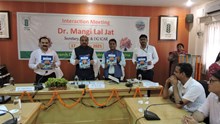
In the modern age, increasing pollution levels in every sphere of life are the key challenge to the sustainable development of our environment. Increasing demands and lavish lifestyles of people cause environmental deterioration. Our agricultural system is also affected by pollution. Modern agricultural practices such as the use of synthetic fertilizers, pesticides, etc. to maximize crop yield contribute to environmental pollution.
These approaches ultimately disturb the nutrient balance of the soil and therefore reduce soil fertility. To deal with the existing problem, Organic farming provides a natural way of crop cultivation by using environment friendly, animal and plant-based local organic resources that are highly enriched in nutrients required for crop plants. It enhances microbial activities and increases soil health.
Organic farming is an efficient and promising agricultural approach for environmental sustainability as it provides yield stability, improved soil health, no environmental concerns, organic food, and a reduction in the use of synthesized fertilizers. There are different agricultural approaches working to reduce environmental concerns but the use of organic farming, is no doubt, the best scientifically proven environment-friendly approach to maintaining an ecological balance of our agriculture and ecological systems.
The approach of organic farming is dependent upon a variety of building elements. Organic manure, Crop rotation, Vermicomposting, Nitrogen-fixing microorganisms, organic residue, crop residue, bio-fertilizers, biopesticides, kitchen waste, sludge, and biogas are some of the main elements. These are proved to be very useful in maintaining soil health and texture. Their use is eco-friendly and helps in developing sustainable agriculture.
Apart from these, the organic agricultural approach follows some basic principles of Health, Ecology, Fairness, and Care. These principles are the core of organic agriculture that ensures sustainable development. In organic farming, more emphasis is given to environmental health. Due to its nature-friendly approach, it helps in reducing soil, water, and air pollution. Therefore, acts as a natural tool for environmental protection and sustainable development.
Farmers use crop rotation, bio-fertilizers, etc. to maintain the enrichment of nitrogen and other essential crop nutrients. The use of chemicals in the field is prohibited and eco-friendly products are taken into consideration. Vegetables are also grown in the field using the organic farming approach, ensuring the availability of organic vegetables in the food markets.
Many legislations and policies have been framed across the globe for the development of organic farming but some parts of the world are still needed the proper implementation of the policies at the regional level. With time, organic farming attracts people across the globe. With its effectiveness, the organic sector has to deal with the persisting challenges.
Therefore, it is the need of the hour to frame and implement the organic sector policies with the society’s stakeholder’s involvement which ultimately improves organic farming. It is concluded that proper follow-up, ground-level implementation, impact analysis, and public awareness is the key to success of every policy. A better policy leads to sustainable development and helpful in achieving the goal of sustainable environment.
Author
Suresh Kumar
MSc. Soil Science
Sher-e-Kashmir University of Agricultural Sciences and Technology of Jammu













Share your comments